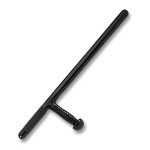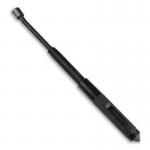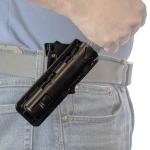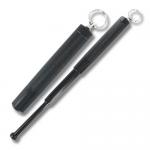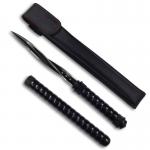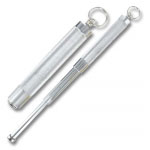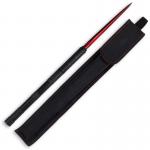Collapsible Batons & Police Nightsticks for Self-Defense
-
$32.95
-
$29.95
-
$69.95
-
From $174.95
-
$29.95
-
$29.95
-
$32.95
-
$22.95
-
$84.95
-
$179.95
-
$44.95
-
$23.95
-
From $174.95
-
$22.95
-
$16.95
-
$64.95
Batons are nothing new. In fact, they've been around for centuries, evolving from simple clubs and staffs into the sleek, tactical tools we see today. Historically, batons were often used by law enforcement as a non-lethal way to control or subdue suspects. The police nightstick is one of the most iconic versions, widely recognized in pop culture and seen in nearly every police department across the globe. It's a short, sturdy weapon that's easy to carry and quick to deploy. But over time, batons evolved. Now, you can find expandable batons, telescoping batons, and self-defense batons in all shapes and sizes, each with its unique advantages.
To understand how we got here, it helps to know where batons came from. In the West, batons (especially nightsticks) date back to medieval times, where they were often used as a tool for crowd control and personal defense. In the modern world, though, they became popularized by law enforcement, especially in the early 20th century. The police baton became synonymous with authority, discipline, and control. They were designed specifically for non-lethal defense, as opposed to knives or guns, and offered a way to maintain order without causing permanent harm.
Meanwhile, in Asia, batons have a strong presence in various martial arts. The bo staff, a long wooden stick, is a key weapon in Karate, Kendo, and several other disciplines. The principles of martial arts carried over when batons started being designed for modern-day use. The collapsible baton that we know today likely owes its origins to both ancient martial arts techniques and the practical needs of modern law enforcement.
What makes a baton so great is its simplicity. When you need a self-defense tool, you don't want something overly complicated. A spring-loaded baton or telescoping baton can be deployed with a quick flick of the wrist or the push of a button, and are incredibly easy to conceal. This makes them a great option for security professionals who need to keep a weapon hidden but still easily accessible. The collapsible baton is popular because it takes up very little space, but once extended, it's solid enough to take down an opponent if need be.
One of the biggest advantages of the expandable baton is how it allows you to create space between yourself and a potential threat. It can be especially useful in situations where physical distance is crucial, giving you a clear advantage over an attacker who might be too close for comfort. And since telescoping batons collapse to a compact size, they can easily fit into a bag or holster without adding bulk to your gear.
Using a baton might seem simple; extend it, swing it, and defend yourself. But there's more to it than just that. If you're planning on carrying a baton for self-defense, it's important to understand how to use it effectively. The self-defense baton is all about control and leverage, not just brute force. Whether you're dealing with an attacker or trying to disarm someone, the key is to use the baton's reach to your advantage.
A spring-loaded baton offers speed and surprise. With the push of a button, it extends instantly, giving you a huge advantage in a self-defense situation. These collapsible batons are often favored for their stealthiness. You can keep them hidden until you need them, making them perfect for people who want to carry a self-defense weapon that doesn't look obvious. But, make sure you check your local laws before carrying any self-defense weapon; especially if you plan on concealing it.
As a tool, the police baton can be used in a number of ways: striking, blocking, and even restraining. But the real magic comes in its ability to incapacitate an opponent quickly while minimizing harm. Batons are designed to give you control over the situation; whether you're fending off an attacker or creating an opening to escape. And because they're usually lightweight and easy to handle, they can be used with a variety of grips and techniques. So, while a nightstick may look like just a piece of wood or metal, it's actually a finely tuned tool that can give you real control in a dangerous situation.
Now, let's dive deeper into telescoping batons. These have become some of the most popular batons for both law enforcement and personal defense. The design of these batons makes them ideal for people who need a compact, effective tool. These extendable batons are made of multiple segments that collapse and expand when you slide or flick them. They're incredibly sturdy, with most models being made from high-quality materials like steel. When fully extended, these batons can reach lengths of 16 to 32 inches, offering you a longer reach than a standard police nightstick.
If you're into martial arts or looking to train with a new weapon, expandable batons are also great for practicing self-defense moves. They're lightweight but can pack a punch when wielded correctly. These self-defense batons are incredibly useful for anyone who wants to have an easy-to-carry weapon with tactical versatility.
At KarateMart, we carry a wide selection of expandable batons, nightsticks, and spring-loaded batons. So, no matter what you're looking for, we've got you covered. Whether you're in law enforcement, a security guard, or just want something for personal protection, we've got the right baton for you. Our batons are designed with durability and ease of use in mind, and they come in various sizes and materials. So if you want a baton that's going to be both effective and reliable, you're in the right place.
From the iconic nightstick to the high-tech spring-loaded baton, all of our products are carefully selected for its quality and functionality. We know that when you're looking for a self-defense weapon, you want something you can trust, and we make sure to provide only the best. No matter your experience level, whether you're a beginner or a seasoned pro, we're here to help you find the perfect baton for your needs.
So, if you're ready to step up your self-defense game or add a new tool to your tactical gear, check out our collection today. We've got everything you need to feel confident, prepared, and in control.
Are Police Nightsticks the Same as Civilian Batons?
Police nightsticks and civilian batons serve the same basic purpose, but they are not always identical in design. A traditional nightstick is usually a fixed-length baton made of wood or heavy-duty polycarbonate, commonly seen on law enforcement duty belts. Civilian batons, on the other hand, are more often expandable or collapsible models that can be carried discreetly and extended when needed. While both tools provide reach and striking power, police nightsticks tend to be bulkier and geared toward professional use, while expandable batons offer everyday convenience for personal defense.
Is a Baton Good for Self Defense in Real-World Situations?
Yes, a baton can be effective for self defense when it is legal to carry in your area and you practice basic handling. Its biggest advantages are reach, control, and deterrence. A self defense baton lets you create distance so you are not forced into close contact, and many confrontations end the moment an attacker sees an expandable baton snap into place. Collapsible and telescopic batons also carry discreetly and deploy quickly, making them practical for everyday use.
Compared to knives or firearms, a baton focuses on impact and leverage rather than penetration, which is why many people prefer it for defensive situations. A strike to a large muscle group or limb can stop a threat long enough to escape, and the goal is always to break contact rather than fight. Police nightsticks offer maximum durability and control, while compact telescopic models are better suited for civilian carry.
Training is important for learning proper grip, stance, and striking techniques. Even a little practice with a collapsible or expandable baton can improve confidence and safety. No tool is perfect, but when used responsibly, a baton provides a practical balance of prevention, distance, and stopping power in real-world self defense. Always check local laws before carrying one.
What Baton Size Is Best for Everyday Carry?
The best baton size for everyday carry depends on how you plan to use it and how easily you want to conceal it. Compact models around 16 to 21 inches are popular because they strike a balance between portability and effectiveness. A smaller collapsible baton is easier to carry in a bag, glove box, or on a belt without drawing attention, but it still provides enough reach to create distance in a self defense situation.
Longer expandable batons in the 24 to 26 inch range are often preferred by law enforcement and security professionals who need more stopping power and leverage. While these larger batons deliver stronger strikes, they are harder to conceal and less comfortable for everyday carry. Many civilians find that a telescopic baton in the mid-size range gives them the best mix of reach, speed, and convenience.
Ultimately, the right size baton for self defense comes down to personal comfort and lifestyle. If you prioritize concealment and quick access, a shorter collapsible baton makes sense. If you value maximum reach and striking force, a longer expandable baton may be the better choice. In either case, practicing with your baton ensures that you can use it effectively regardless of size.
Are Batons Legal to Carry for Self Defense?
The legality of carrying a baton depends entirely on where you live. In some states and countries, police batons and expandable batons are restricted to law enforcement, while in other areas collapsible or telescopic batons can be owned by civilians without issue. Even within the United States, laws can vary dramatically from one state to the next, and in certain regions there are restrictions on carrying a baton in public even if owning one is legal.
Because the rules change so much by location, it's important to check your local and state laws before carrying a baton for self defense. Some areas allow possession but prohibit concealed carry, while others require a specific permit. If you are considering keeping an expandable baton in your vehicle or carrying a collapsible baton on your belt, make sure you understand the regulations in your city and state first. This ensures that you stay compliant and can use your baton responsibly if you ever need it.
What Materials Are Batons Made From?
Batons are manufactured from a range of materials, each chosen for a balance of weight, durability, and striking power. Traditional police nightsticks were often made from hardwoods like hickory or oak, which provided strength and impact resistance. Modern expandable and collapsible batons are more commonly built from steel, aluminum, or polycarbonate. Steel telescopic batons deliver the heaviest strikes, while aluminum versions are lighter and faster to handle, making them popular for everyday carry.
Polycarbonate and other polymer batons are designed to reduce weight while still offering enough strength for training or defensive use. Some models also include rubberized or textured grips to improve control under stress. The choice of material affects how a baton feels in hand, how easily it can be carried, and how much force it generates on impact. For self defense, many people prefer the reliability of a steel expandable baton, while those who want something lighter and easier to conceal often choose aluminum or reinforced polymer options.
Do I Need Training to Use an Expandable or Collapsible Baton Effectively?
While a baton is simple to use compared to many other self defense tools, some training is highly recommended if you want to handle it effectively and safely. Learning how to properly grip a collapsible baton, how to extend it quickly, and how to adopt a balanced stance can make a big difference in both confidence and performance. Even a few hours of practice helps you understand where to strike, how much force to use, and how to avoid injuring yourself by mishandling the baton.
Expandable and telescopic batons are designed to give you reach and control, but without practice they can feel awkward to deploy under stress. Training provides familiarity with opening and closing mechanisms, striking large muscle groups rather than vulnerable areas, and using the baton to block or redirect an attack. You don't need to be a martial artist to benefit, but short, regular practice sessions are enough to make sure your baton is an asset rather than a liability in a self defense situation.
What's the Difference Between a Police Baton and a Telescopic Baton?
A police baton, often called a nightstick, is usually a fixed-length club made of hardwood, polycarbonate, or composite materials. These batons are durable, heavy, and designed for professional use by law enforcement officers who need maximum control and striking power. Because they don't collapse, police batons are less convenient to carry discreetly, but they are reliable, sturdy, and ready to use at all times.
A telescopic baton, on the other hand, is designed for portability and civilian self defense. It collapses down to a compact size for easy carry and can be extended quickly with a flick of the wrist. While telescopic batons are generally lighter than traditional police nightsticks, they still provide reach and striking ability in an emergency. Many people prefer a telescopic or expandable baton because it combines practicality with concealability, making it easier to keep on hand for everyday protection.







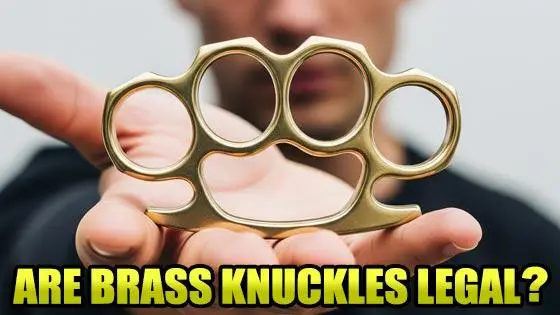

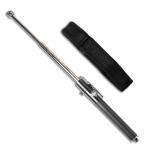
 (1)
(1)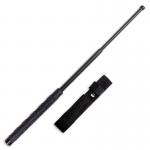
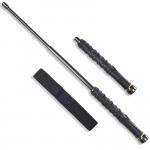
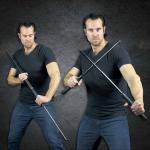

 (5)
(5)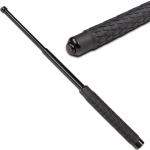
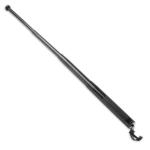
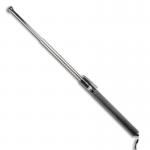
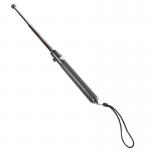

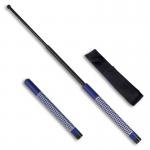
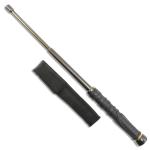
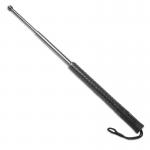
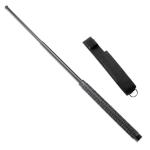
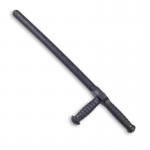

 (7)
(7)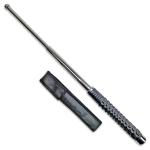
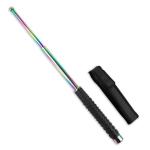
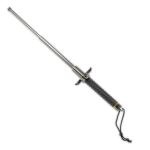
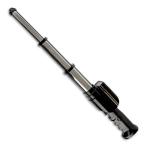
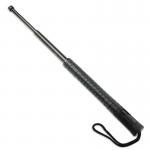
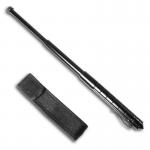
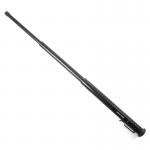
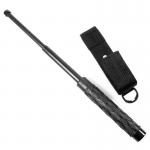
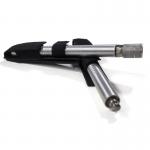
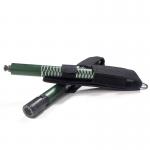

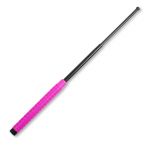
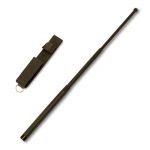
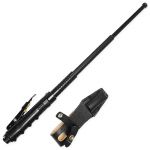
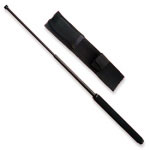
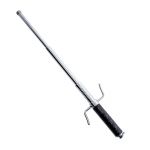
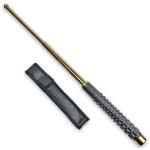
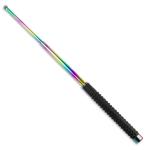
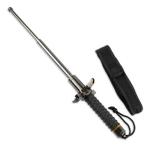
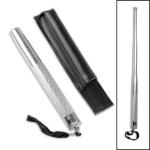
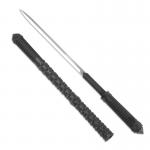
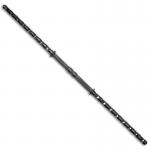
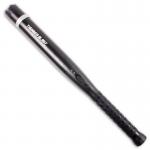
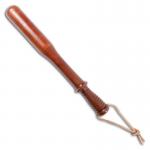
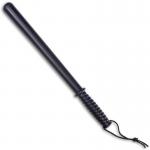
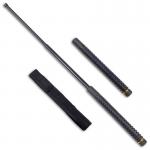
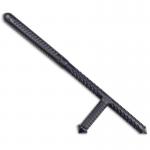
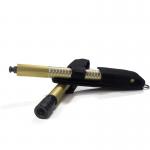

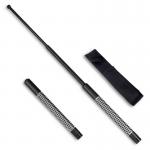
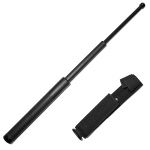
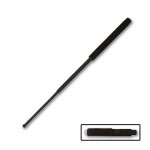
 (1)
(1)